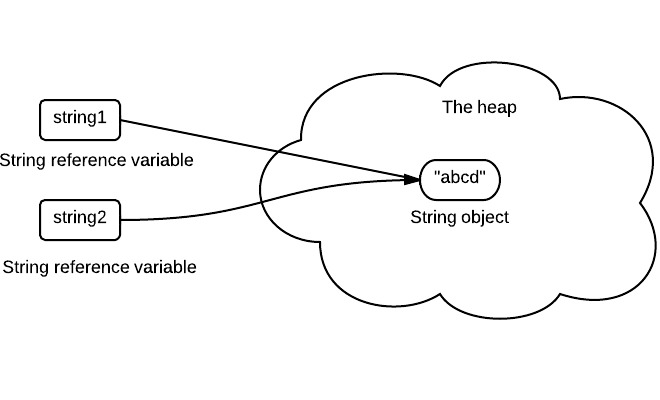What Is Unalterable Strings and Just How It Works
In the world of programs, recognizing the idea of immutable strings is critical for producing robust and safe and secure applications. Unalterable strings refer to strings that can not be altered after they are produced, making certain information stability and predictability within the code.
The Basics of Unalterable Strings
Immutable strings, as an essential principle in programs, are character series that can not be changed once they are developed. This means that once a string is designated a value, that worth can not be altered. In languages like Python and Java, strings are unalterable things, causing various ramifications in regards to memory administration and data stability.
Among the key benefits of unalterable strings is that they give a sense of security in information adjustment. Since the material of an immutable string can not be modified, it guarantees that the initial information continues to be intact, minimizing the threat of unexpected changes during program execution (Why are strings immutable in Java?). This building also streamlines debugging processes, as programmers can trust that when a string is defined, its worth will certainly not be accidentally modified
When a new string is produced based on an existing one, instead than customizing the initial string, the new worth is kept individually. On the whole, understanding the fundamentals of unalterable strings is critical for grasping programs ideas and optimizing code effectiveness.
Advantages of Unalterable Strings
Building upon the safety and effectiveness advantages of unalterable strings, their benefits extend to enhancing code integrity and simplifying concurrent programming jobs. By being unalterable, strings can not be modified after production, which removes the risk of unintended adjustments in the data they save. This fundamental immutability guarantees that as soon as a string is produced, its value continues to be consistent throughout the program's execution, decreasing the possibilities of pests triggered by unexpected modifications.
Furthermore, immutable strings contribute to code integrity by making it less complicated to reason regarding the state of a program. Because strings can not be transformed, programmers can rely on that a string will certainly constantly hold the exact same value, simplifying debugging and maintenance initiatives. This predictability causes more reputable and secure codebases.

Implementation in Shows Languages
Within different programming languages, the unification of unalterable strings is a basic aspect that impacts Related Site how data is dealt with and controlled within code structures. The execution of immutable strings differs throughout various programs languages, with each language providing its very own mechanisms to sustain this idea.

In contrast, languages like C and C++ do not have built-in assistance for unalterable strings. Developers in these languages have to by hand carry out immutability by implementing rules within their code to avoid straight adjustments to string things.
Finest Practices for Working With Unalterable Strings
When dealing with unalterable strings in programs languages like Java and Python, sticking to finest practices makes sure effective and protected information adjustment. One of the vital finest methods is to utilize StringBuilder or StringBuffer as opposed to directly controling strings, particularly when handling comprehensive concatenation operations. These classes supply mutable alternatives for string adjustment, assisting to prevent unnecessary memory allowances and enhancing performance.
Additionally, when working with delicate information such as passwords or API tricks, it is vital to prevent saving them as plain text in immutable strings. Utilizing protected storage systems like char arrays or specialized collections for taking care of delicate info aids reduce security threats associated with unalterable strings.
Real-world Applications and Examples
Checking out useful implementations of immutable strings in various industries reveals their considerable effect on information integrity and system dependability. In the medical care field, immutable strings play an important duty in ensuring the protection and privacy of patient information. By stopping unauthorized modifications to delicate info such as medical records and prescriptions, immutable strings help preserve compliance with stringent privacy laws like HIPAA.
Banks additionally take advantage of the immutable nature of strings to boost the safety and security of customer information and deal records. Unalterable strings aid protect against fraudulence and unapproved changes to financial information, providing a robust defense versus cyber threats and guaranteeing the trust fund and confidence of clients.

Verdict
In verdict, unalterable strings are dealt with and unchangeable series of personalities that offer advantages such as string security and enhanced efficiency in programming. They are applied in various shows languages to make certain information honesty and protection. Best practices for dealing with unalterable strings consist of staying clear of direct modifications and using approaches that return brand-new string objects. Real-world applications of immutable strings consist see page of information security, caching, and string control jobs.
Unalterable strings refer to strings that can not be changed after they are created, making sure information honesty and predictability within the code. When a brand-new string try here is developed based on an existing one, rather than customizing the original string, the brand-new worth is kept independently.In languages like Java and Python, strings are unalterable by default, meaning that when a string things is created, its worth can not be transformed - Why are strings immutable in Java?. Ideal techniques for working with unalterable strings include preventing direct adjustments and making use of methods that return new string items. Real-world applications of immutable strings consist of data security, caching, and string control jobs